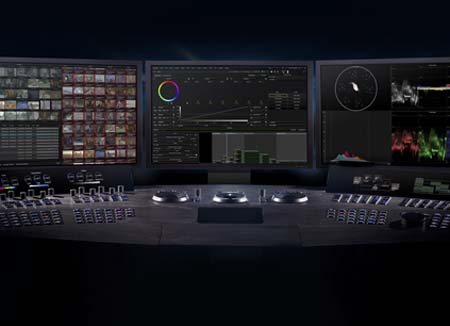FilmLight is to demonstrate new functionality for its colour grading and management platform Baselight at IBC 2018 at stand 7.B26. The latest software will be shown on Baselight grading stations, and also implemented across FilmLights product range, which includes Prelight for on-set visualisation, the Daylight dailies system and the expanding Baselight Editions range for editing […]
 FilmLight is to demonstrate new functionality for its colour grading and management platform Baselight at IBC 2018 at stand 7.B26. The latest software will be shown on Baselight grading stations, and also implemented across FilmLights product range, which includes Prelight for on-set visualisation, the Daylight dailies system and the expanding Baselight Editions range for editing and VFX.
FilmLight is to demonstrate new functionality for its colour grading and management platform Baselight at IBC 2018 at stand 7.B26. The latest software will be shown on Baselight grading stations, and also implemented across FilmLights product range, which includes Prelight for on-set visualisation, the Daylight dailies system and the expanding Baselight Editions range for editing and VFX.
Baselights new features reportedly help to streamline complex and time-consuming workflows both within the colour grading suite and in collaboration with editing, VFX and 360° VR.
Commenting on the new features, Martin Tlaskal, Lead Developer at FilmLight, said: From multi-national facilities to independent colourists, Baselight users are at the cutting edge of colour grading. With their feedback and ideas, weve examined the content creation pipeline to find ways to make a tangible difference.
Intelligent branching means that different operators can now work on the same scene simultaneously with ease, either to perform specific tasks or to create multiple deliverables.
This new feature means that different versions of a scene, called branches, can be produced and assigned to different operators for specific jobs, such as rotoscoping or fixing metadata in the timeline. When that task has been completed, the branch can be merged back into the main timeline easily and efficiently via the new Merge View, which also displays conflicts so that they can be resolved. This eliminates the error-prone and manual process of copying and pasting operations from multiple timelines back into the master timeline.
This same feature allows long-life branches to be created for different deliverables such as 2D, stereo 3D and HDR versions. The creative grades from the master timeline can then be merged down into the deliverable branches as the master is finalised.
Visitors to the stand will also experience per-pixel alpha channels within Baselight. Per-pixel alpha eliminates the requirement for all alpha compositing to be done via an additional layer matte, thereby reducing stack size and complexity. This makes it much easier to construct more complex compositing stacks, and also means improved quality when images with alpha are resized.
FilmLight is also demonstrating the Panorama sandwich, a natural way to use the full functionality of Baselight while working on distorted 360° footage. The colourist can create an undistorted camera view of any part of the image, and dynamically animate the view to follow any object in a scene. This mechanism is particularly powerful when you need to grade or process an element that appears across the seam of the image, which otherwise would make shape creation and tracking very difficult, the release stated.
With HDR a hot topic, new Baselight functionality is also aimed at developing looks within the extended range and colour gamut, which can then be faithfully retained across the multitude of delivery formats expected today. Boost Range, for example, is an automated tool to boost the dynamic range of an image from SDR to HDR using complex spatial processing to achieve a natural look, while Texture Highlight uses frequency analysis to avoid blocky highlights. In addition, with Dolby Vision experiencing more HDR releases every day, visitors to IBC will also be able to witness Baselights support for the latest Dolby software CMU.
Other new features include the Blend panel, which provides a visual reference to highlight the inputs and output of blend operations, and Media Import Settings that allow you to set up rules to be applied whenever media is inserted into a scene or conformed from an ALE, such as overriding sequence parameters.
The new functionality we are demonstrating at IBC shows our commitment to helping our customers produce higher-quality images, more quickly, Tlaskal added, especially when working as part of a team.
The new software features, along with the complete collaborative workflow and FilmLight product range, will be demonstrated on stand 7.B26 at IBC.
As well as product and workflow demonstrations on the show floor, this year FilmLight is also presenting its Colour Day workshop programme on Sunday 16 September, featuring Maxine Gervais of Technicolor; St Louiss Sylvain Canaux; and Mike Nuget, New York-based freelance colourist on Baselight for Avid.














































































